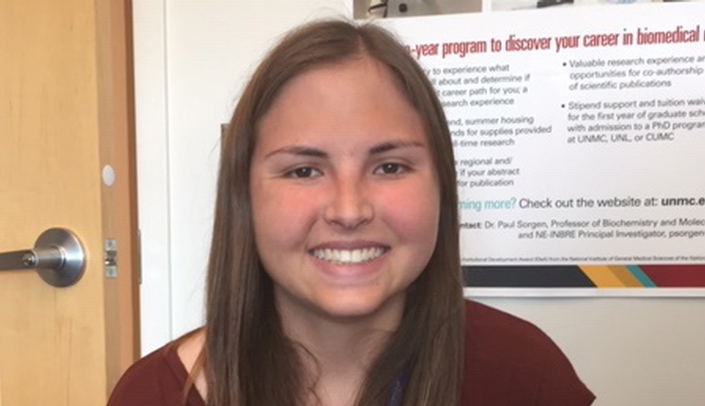On May 28, the Nebraska Institutional Development Award Program (IDeA) Networks of Biomedical Research Excellence (INBRE) program welcomed 29 undergraduate students from across Nebraska as they embark on their summer research experience at Creighton University, the University of Nebraska-Lincoln and the University of Nebraska Medical Center.
The INBRE program is overseen by Paul Sorgen, Ph.D., a professor in the department of biochemistry and molecular biology at UNMC and principal investigator of the $16.2 million National Institutes of Health grant that supports the program.
Established in 2001, the INBRE program was created to expose students to serious biomedical research, build a statewide biomedical research infrastructure between undergraduate and graduate institutions and to strengthen undergraduate institution's infrastructure and increase its capacity to conduct cutting-edge biomedical and behavioral research.
The students, referred to as INBRE scholars, enter the program after completing their sophomore year of college upon recommendation by their college professors. The students receive a two-year scholarship and spend 10 weeks each summer conducting research on either their home campus or at UNMC, the University of Nebraska-Lincoln or Creighton University.
At the end of the summer, the students attend the INBRE annual meeting where they give an oral presentation on their research project.
Below Ali Osborn, a biochemistry major at Doane University talks about her INBRE experience.
Has science always been a part of your life?
"I grew up very interested in mathematics from a very young age, always carrying one of those math books around my house during the summer, but not necessarily science. I enjoyed all the classes I had in middle school, especially the biology classes, but wasn’t really excited about it until high school. My biology class that I took during my freshman year got me very interested because it was the first time genetics was actually talked about in detail. Since then science has been an important part of my life. "
How is it important to you?
"Science and genetics have been directly connected to my life since I was a child. Being born with a genetic disorder, I was very interested in learning how little letters being switched can change and affect so many things in my life and many other peoples' lives. I have found science in general as a very important part of my life because I have always gravitated towards more analytical studies and had a drive to learn more about the world. Science is perfect for that because there is always so much to learn and so much that is unknown that can be discovered. Just in the past year I have learned so much about genetics and how complicated everything can get, giving me so many directions to go in my future studies."
Why did you choose to participate in the INBRE program?
"Since starting college at Doane University, I have had the dream to go to graduate school and get my PhD in genetics, but I have not determined what exactly will be my focus. I also immediately heard about the INBRE program my freshman year from former scholar. I was looking for as much research as possible as well as something that would help me get into a good graduate school."
What do you hope to gain from this program?
"I don’t expect myself to understand everything I am working on right away, so I mainly want to gain experience. I want experience in working in a graduate style lab, just working in a lab in general, and learning more about being an adult. This a great opportunity to just meet more scientists in this field as well as have more researchers to work with in my future endeavors. I am so excited to gain more knowledge about working in a lab and in the field of genetics."
We are Nebraska Medicine and UNMC. Our mission is to lead the world in transforming lives to create a healthy future for all individuals and communities through premier educational programs, innovative research and extraordinary patient care.
Twitter | Facebook | Instagram | YouTube | Flickr
